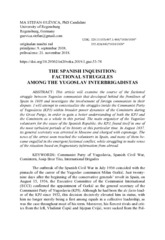Retrospective Lessons and Generational Gaps: The Impact of Yugoslav Communist Émigrés in Interwar Czechoslovakia on the Postwar Yugoslav State
Чланак у часопису (Објављена верзија)
Метаподаци
Приказ свих података о документуАпстракт
This article will examine the course of the factional struggle between Yugoslav communists that developed behind the frontlines of Spain in 1938 and investigate the involvement of foreign communists in their dispute. I will attempt to contextualize the struggles inside the Communist Party of Yugoslavia (KPJ) within broader power dynamics of the Comintern during the Great Purge, in order to gain a better understanding of both the KPJ and the Comintern as a whole in this period. The main organizer of the Yugoslav volunteers for the cause of the Spanish Republic, the KPJ, found itself in one of the most turbulent periods of its history at this particular time. In August 1937, its general secretary was arrested in Moscow and charged with espionage. The news of the arrest soon reached the volunteers in Spain, and many of them became engulfed in the emergent factional conflict, while struggling to make sense of the situation based on fragmentary information from abroad.
Кључне речи:
Communist Party of Yugoslavia / Comintern / Josip Broz Tito / Spanish Civil War / International BrigadesИзвор:
Istorija 20. veka, 2019, 37, 1, 53-74Издавач:
- Beograd: Institut za savremenu istoriju
Колекције
Институција/група
IFDTTY - JOUR AU - Gužvica, Stefan PY - 2019 UR - http://rifdt.instifdt.bg.ac.rs/123456789/2571 AB - This article will examine the course of the factional struggle between Yugoslav communists that developed behind the frontlines of Spain in 1938 and investigate the involvement of foreign communists in their dispute. I will attempt to contextualize the struggles inside the Communist Party of Yugoslavia (KPJ) within broader power dynamics of the Comintern during the Great Purge, in order to gain a better understanding of both the KPJ and the Comintern as a whole in this period. The main organizer of the Yugoslav volunteers for the cause of the Spanish Republic, the KPJ, found itself in one of the most turbulent periods of its history at this particular time. In August 1937, its general secretary was arrested in Moscow and charged with espionage. The news of the arrest soon reached the volunteers in Spain, and many of them became engulfed in the emergent factional conflict, while struggling to make sense of the situation based on fragmentary information from abroad. PB - Beograd: Institut za savremenu istoriju T2 - Istorija 20. veka T1 - Retrospective Lessons and Generational Gaps: The Impact of Yugoslav Communist Émigrés in Interwar Czechoslovakia on the Postwar Yugoslav State IS - 1 VL - 37 SP - 53 EP - 74 DO - 10.29362/ist20veka.2019.1.guz.53-74 ER -
@article{
author = "Gužvica, Stefan",
year = "2019",
abstract = "This article will examine the course of the factional struggle between Yugoslav communists that developed behind the frontlines of Spain in 1938 and investigate the involvement of foreign communists in their dispute. I will attempt to contextualize the struggles inside the Communist Party of Yugoslavia (KPJ) within broader power dynamics of the Comintern during the Great Purge, in order to gain a better understanding of both the KPJ and the Comintern as a whole in this period. The main organizer of the Yugoslav volunteers for the cause of the Spanish Republic, the KPJ, found itself in one of the most turbulent periods of its history at this particular time. In August 1937, its general secretary was arrested in Moscow and charged with espionage. The news of the arrest soon reached the volunteers in Spain, and many of them became engulfed in the emergent factional conflict, while struggling to make sense of the situation based on fragmentary information from abroad.",
publisher = "Beograd: Institut za savremenu istoriju",
journal = "Istorija 20. veka",
title = "Retrospective Lessons and Generational Gaps: The Impact of Yugoslav Communist Émigrés in Interwar Czechoslovakia on the Postwar Yugoslav State",
number = "1",
volume = "37",
pages = "53-74",
doi = "10.29362/ist20veka.2019.1.guz.53-74"
}
Gužvica, S.. (2019). Retrospective Lessons and Generational Gaps: The Impact of Yugoslav Communist Émigrés in Interwar Czechoslovakia on the Postwar Yugoslav State. in Istorija 20. veka Beograd: Institut za savremenu istoriju., 37(1), 53-74. https://doi.org/10.29362/ist20veka.2019.1.guz.53-74
Gužvica S. Retrospective Lessons and Generational Gaps: The Impact of Yugoslav Communist Émigrés in Interwar Czechoslovakia on the Postwar Yugoslav State. in Istorija 20. veka. 2019;37(1):53-74. doi:10.29362/ist20veka.2019.1.guz.53-74 .
Gužvica, Stefan, "Retrospective Lessons and Generational Gaps: The Impact of Yugoslav Communist Émigrés in Interwar Czechoslovakia on the Postwar Yugoslav State" in Istorija 20. veka, 37, no. 1 (2019):53-74, https://doi.org/10.29362/ist20veka.2019.1.guz.53-74 . .



